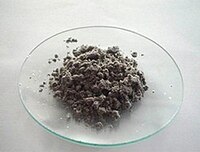
Photo from wikipedia
Due to the relatively high capacity and lower cost, transition metal sulfides (TMS) as anode show promising potential in sodium-ion batteries (SIBs). Herein, a binary metal sulfide hybrid consisting of… Click to show full abstract
Due to the relatively high capacity and lower cost, transition metal sulfides (TMS) as anode show promising potential in sodium-ion batteries (SIBs). Herein, a binary metal sulfide hybrid consisting of carbon encapsulated CoS/Cu2 S nanocages (CoS/Cu2 S@C-NC) is constructed. The interlocked hetero-architecture filled with conductive carbon accelerates the Na+ /e- transfer, thus leading to improved electrochemical kinetics. Also the protective carbon layer can provide better volume accommondation upon charging/discharging. As a result, the battery with CoS/Cu2 S@C-NC as anode displays a high capacity of 435.3 mAh g-1 after 1000 cycles at 2.0 A g-1 (≈3.4 C). Under a higher rate of 10.0 A g-1 (≈17 C), a capacity of as high as 347.2 mAh g-1 is still remained after long 2300 cycles. The capacity decay per cycle is only 0.017%. The battery also exhibits a better temperature tolerance at 50 and -5 °C. A low internal impedance analyzed by X-ray diffraction patterns and galvanostatic intermittent titration technique, narrow band gap, and high density of states obtained by first-principle calculations of the binary sulfides, ensure the rapid Na+ /e- transport. The long-cycling-life SIB using binary metal sulfide hybrid nanocages as anode shows promising applications in versatile electronic devices.
Journal Title: Small
Year Published: 2023
Link to full text (if available)
Share on Social Media: Sign Up to like & get
recommendations!